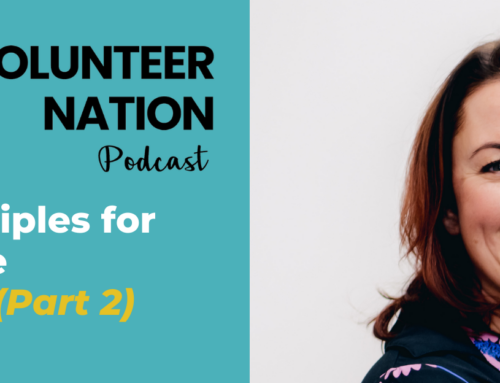What is a Volunteer? The Difference Between Supporters & Employees
As nonprofits and other volunteer-involving organization build back from COVID, they are seeking new ways to involve volunteers and are also asking, “what is a volunteer?”
Because there has been so much shuffling of staff under duress, it’s become more difficult to differentiate between paid and unpaid roles.
But it’s important to draw a clear line between what is unpaid volunteer work and what is paid employee work for many reasons.
When the lines are clear, employees are less concerned that “volunteers will take my job.” Volunteers are not resentful that they are not paid for equal work. And your organization stays out of hot water with federal labor departments.
As organizations that engage volunteers, it’s vital that you maintain a strong ethical foundation, operate within the letter of the law and take care not to exploit volunteers or employees.
Organization’s that simply “wing it,” run the risk of lawsuits, penalties, and a damaged reputation not only to their own organization but also to the enterprise of volunteerism as a while. So, take care to know the laws and regulations that guide you.
For more on how to design volunteer roles, download our Free Tool: Volunteer Resourcing Plan Template HERE >>
What is a “Volunteer”?
The federal Department of Labor in the United States (and similar agencies in other countries) is responsible for enforcing the law around employment and ensuring that everyone who has a right to pay is being paid properly.
When deciding what laws have jurisdiction over a worker, we must first determine whether or not they are indeed considered a “volunteer” in the eyes of the law.
This agency has developed definitions that help us understand whether or not a worker is an employee or a volunteer. If they are deemed to be an employee, then they have the right to pay for their work. if they are not paid, and they submit a complaint to the department of labor, the agency will become liable for back pay, taxes, unemployment insurance, and possible penalties.
To be considered a true volunteer, according to the US Department of Labor, all of the following factors must be true:
- The entity that benefits from the service is a nonprofit (or government agency)
- The activity is less than full time
- The services are not offered as a result of coercion
- The services are typically associated with volunteer work
- No regular employees have been displaced by the volunteer
- The volunteer does not expect to be compensated (there are also limitations on the perks they can receive, which they often must pay tax on)
For more on how pay and perks impact volunteers, check out Volunteer Stipends, Interns, and Employee Volunteers: Some Important Things to Know HERE >>
The Fair Labor Standards Act (FLSA) is the statute that governs which workers are considered employees and which are volunteers. It is the standard against which federal staff would assess a complaint about worker pay.
According to the US Department of Labor,
“The FLSA recognizes the generosity and public benefits of volunteering and allows individuals to freely volunteer in many circumstances for charitable and public purposes.
Individuals may volunteer time to religious, charitable, civic, humanitarian, or similar nonprofit organizations as a public service and not be covered by the FLSA.
Individuals generally may not, however, volunteer in commercial activities run by a non-profit organization such as a gift shop.
A volunteer generally will not be considered an employee for FLSA purposes if the individual volunteers freely for public service, religious or humanitarian objectives, and without contemplation or receipt of compensation.
Typically, such volunteers serve on a part-time basis and do not displace regular employed workers or perform work that would otherwise be performed by regular employees.
In addition, paid employees of a non-profit organization cannot volunteer to provide the same type of services to their non-profit organization that they are employed to provide.”
Unfortunately, many nonprofits are not aware of these stipulations and do not realize that they may be breaking the law when they include volunteers as gift shop helpers or when paid hourly staff “volunteer” to help without pay.
For the source document, check out US DOL Fact Sheet #14A: Non-Profit Organizations and the Fair Labor Standards Act (FLSA) HERE >>
Volunteer or Paid Staff? Defining the Difference
Because of the transient and part time nature of volunteer work, volunteer activity should augment the work of paid staff, not replace it.
Although volunteers can help build program capacity, they should never be used to substitute for paid personnel and are not a substitute for adequate program staffing levels.
Nor should volunteers be treated as temporary workers, with little investment in their welfare and to be called upon only when needed.
To prevent misunderstandings, it is important for volunteers and staff alike to clearly delineate the difference between volunteer and staff duties.
Developing distinct position descriptions, volunteer agreements and program policies and procedures for the volunteer program can help decrease the chance of misunderstandings, and thus, risk to the organization.
So, so how can volunteers be engaged to support the agency’s mission?
Volunteers can be used to complement the work of paid staff in many ways:
- To provide special expertise that is missing from paid staff (for example, the use of a pro bono web designer to update the agency web page)
- To expand the hours of paid staff (for example, the use of volunteers to deliver meals on evenings and weekends)
- To assist paid staff in delivering services that do not require professional level expertise (for example, have volunteers provide Medicare benefits counseling, and have paid staff represent clients at administrative appeal hearings)
- To extend the work that would not be done if volunteers were not there to do it (for example, to help out with special projects or extend program services in underserved areas)
If paid staff wish to volunteer their time for the agency for which they also work, it is possible but not for the role for which they were hired and not because they were coerced into doing so.
In addition, it is critical that they be subject to the same formal application process as other volunteers and be subject to the same supervision as other volunteers in the same role.
Similarly, it is possible to hire volunteers for specific roles or contracts, but it’s important that they are not paid work the same work as others who are unpaid.
In addition, volunteers should never be recruited with the implicit promise that they will be given a job at some point in the future.
While volunteers may make wonderful employees, volunteerism should not be treated as a guaranteed pathway to employment.

The Special Case of Interns and Trainees
Trainees, such as school-to-work or internship program participants may volunteer without pay as part of their training. They may also be paid a wage or a stipend for their service. However, that pay is subject to FLSA rules which includes minimum wage requirements and overtime pay, if applicable.
For the source document, check out US DOL Fact Sheet #71: Internship Programs Under the Fair Labor Standards Act HERE >>
Interns or trainees are defined as volunteers if all of the following criteria apply:
- The training, even though it includes actual operation of the facilities of the employer, is similar to that which would be given in a vocational school;
- The training is for the benefit of the trainees or students;
- The trainees or students do not displace paid employees, but work under close supervision;
- The employer that provides the training receives no immediate advantage from the activities of the trainees or students and, on occasion, his operations may even be impeded;
- The trainees or students are not necessarily entitled to a job at the conclusion of the training period; and
- The employer and the trainees or students understand that the trainees or students are not entitled to wages for the time spent in training.
If the internship opportunity does not meet the qualifications above, but meets the criteria related to unpaid volunteers, then the worker can still serve. In this case, however, they should be classified as a volunteer, not an intern or trainee.
What is a Volunteer? Do Your Diligence
While it may be convenient to ignore these rules or convince yourself and others that they don’t apply to you, they still exist.
And, if a volunteer or employee submits a complaint to the Department of Labor (or similar agency in your country), you could find yourself in hot water.
So, take the high road and respect the differences between unpaid volunteers and paid employees.
While volunteers offer what we might consider “free” labor, their value and contributions are so much more than that.
So, treat them accordingly.
As your organization returns to a “new normal” of operations and build back their staffing levels, it’s critical that they think ahead about their future.
This means a thoughtful consideration of volunteer employee roles and what their ultimate staffing structure might entail.
If you plan the paid and unpaid positions you will bring on in advance, you will be less likely to displace one or the other and can support clarity around how each worker contributes to the overall mission.
If you’re unsure about how a worker should be classified, check with the Department of Labor, you can review their database of opinion letters to find similar organizations to yours.
For more on how to submit an opinion letter, check out US DOL Opinion Letter Search Page HERE >>
To settle an internal debate about how your team members should be defined, request an opinion letter that relates to your specific circumstances.
For more on how to submit an opinion letter to the Department of Labor, go HERE >>
Also, as with any labor matter, check with your organization’s labor attorney. If you don’t have one, check with your local bar association to get connected to pro bono legal help.
We are all stewards of positive, productive volunteerism in our communities. As leaders of volunteers, we have an ethical duty to know the laws and the professional ethics that govern our practice.
Let’s take care to ensure that it remains the uplifting, team-centric enterprise than inspires everyone and does not become a cause of disagreement that divides teams and tarnishes your reputation.







